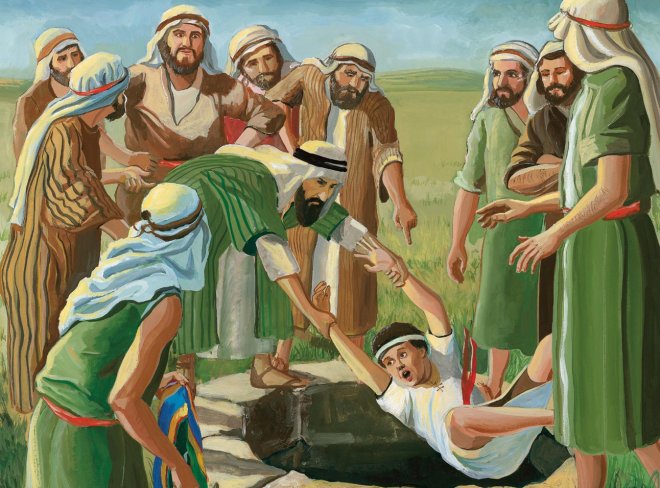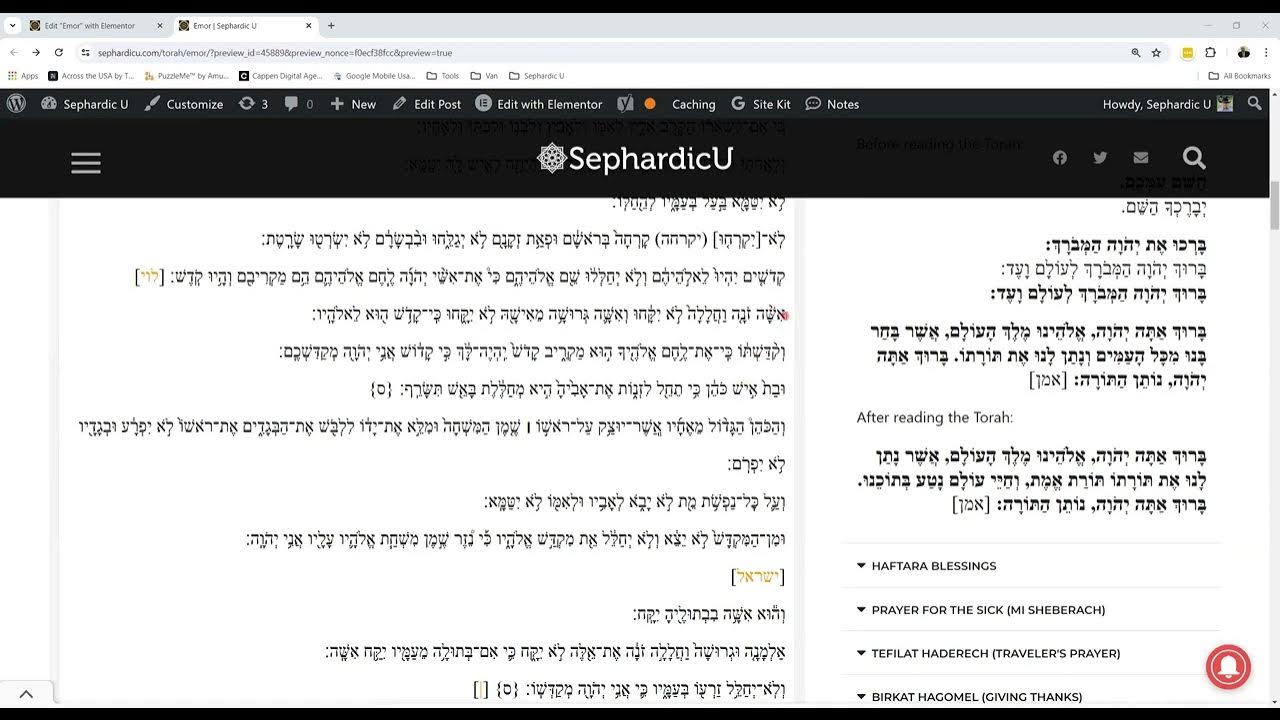For Parashat VaYeshev
I have a confession to make. I love Tanakh. Obsessed with Tanakh. I go back to familiar verses and read them over and over again, looking for unturned stones under which I find treasures. At times, I feel that commentary takes away from the beauty and dynamics of the biblical narrative as the reader travels back and forth from text to commentary. I therefore ask for your indulgence in presenting the first chapter of the Parasha, with my commentary in an experimental way. I wove the commentary into the text, which is presented with verse numbers. There are also question for Shabbat Table discussions at the end (it is allowed to have these discussions at any day of the week.) I would love to hear your thoughts and feedback on this format.
Genesis, Chapter 37
1: [After he drove Esau out of Canaan] Yaakov finally settled in the land where his father, the one he deceived, lived in as a sojourner. 2: The way Yaakov saw it, he had only one child, Yosef, who was seventeen years old and worked with his brothers as a shepherd. Yaakov was unable yet to love Benjamin, since he reminded him of Rahel’s death, and he subconsciously blamed him for it. He was helping the sons of Zilpa and Bilha, his father’s other wives, and would speak bad of them to his father. 3: Israel loved Yosef more than all his sons, he justified him by saying that he was born at his old age, even though Benjamin was the youngest. Yaakov made for Yosef a striped robe.
4: His brothers realized that their father loves him more than all his brothers, so they hated him and could not fake friendship when talking to him. 5: Yosef had a dream and told his brothers, causing them to hate him even more. 6: He told them, please listen to this dream I had. 7: We were gathering sheaves in the field, when suddenly my sheaf stood, towering over yours. Your sheaves circled my sheaf and bowed down to it. 8: His brothers told him, you think you will be our king or our ruler? and they hated him now even more, for his dreams, and for speaking bad of them, because as their hatred intensified, they included past actions, which they previously dismissed, in the list of his faults.
9: He then had another dream and he told it to his brothers. He said, I had a dream where the sun, the moon, and eleven starts bow down to me. The brothers were so infuriated with him that they did not even respond. 10: Not reading their cues, as is typical for a teenage boy, he told it again to his father in his brothers’ presence. His father rebuked him and said, what is this dream? Do you think that me and your mother and brothers will come to bow down to you? 11: His brothers were now jealous of him, because they knew that their father’s rebuke was not genuine. They understood that his father was waiting to see how the dream will be realized.
12: His brothers went to tend to their father’s flocks in Shekhem. 13: Israel told Yosef, your brothers, as you know, are with the flocks in Shekhem, the city which they destroyed defending the honor of their sister and the clan, let me send you to them. He told him; I am ready to go. 14: He told him, please go see how your brothers are doing and how are the sheep and report back to me. Yaakov wanted Yosef to form friendship – שלום, with them, and hoped that Yosef’s quality time with his brothers, without the divisive father’s interference, will help mend the rift between them. He sent him from the valley of Hebron, and he arrived at Shekhem. 15: A man found him in the field, clueless, not knowing that soon his world is going to be destroyed. The man asked him to say what is he looking for. 16: He said, I seek out my brothers, I want to be their friend, please tell me, where are they tending to the flocks? 17: The man said, they traveled away from her, I believe, since I heard them saying “let us go to Dotan!” Yosef went after his brothers and found them in Dotan.
18: They saw him from afar and felt the emotional distance. Before he had a chance to get closer to them physically and emotionally, they detached themselves from him and schemed to murder him. 19: Some of them told each other, brother to brother, with Yosef excluded from the fraternity, here comes that man of dreams. They would neither call him by name, nor refer to him as a brother, as for them he was defined by his resentful actions – man of dreams. 20: They said, let us kill him and throw him in one of the pits. We will tell everyone that he was devoured by a wild beast and let us see then what he dreams about. 21: Reuven heard them, and he saved him from their hand. He said, we will not kill him. 22: Reuven told them, do not shed blood, throw him in this pit in the desert, but do not raise your hand against him, this way he will surely die but you will not be active killers. Reuven did it to save him and return him to his father, but he should have been more forceful and talk them out of the plan altogether.
23: As Yosef, unsuspecting, approached those he thought were his brothers, they stripped him of the robe, the striped robe, which was on him, the symbol of their father’s preference for him and rejection of them. 24: The dragged their naked, struggling brother, treating him as a trapped animal, and threw him into a pit. The pit was empty of water, allowing them to feel that they did not sentence him to death by drowning. 25: They could not stay at the pit because Yosef was screaming and begging for mercy. They walked to a remote place and sat down to eat bread together, making sure that all are there, and no one breaks rank to go back and save him, thus spoiling Reuven’s plans.
During that horrific meal, the banality of cruelty settled in them. Reuven was thinking, fervently, how to save his brother, and was appalled by their ability to dissociate from what they have just done to their brother and father. They then raised their eyes and saw a caravan of men of their great uncle Ishmael’s clan coming from Gilead, with camels carrying goods for sale in Egypt. 26: Yehudah, who apparently was also bothered by his involvement in a potential murder, told his brothers, we gain nothing by murdering our brother and covering his blood. Let us sell him to the Ishmaelites and clear ourselves of responsibility, for he is our brother, our own flesh, and his brothers agreed.
28: Unfortunately, while the brothers were eating, traveling Midianite merchants passed by the pit and heard the screaming boy. They pulled him out of the pit, but before Yosef, overwhelmed with the shock of his brothers’ cruelty and betrayal, had a chance to thank them and tell him who he was, they sold him to the Ishmaelites for twenty silver coins, and the Ishmaelites brought him to Egypt. 29: Meanwhile, on the other side of the dune, after Yehudah suggested to sell Yosef, Reuven rushed to the pit, excited that his plan to save Yosef bore fruits. When he came to the pit, its emptiness hit him. The pit, which previously contained no water, now contained no Yosef. Reuven tore his garments in despair and agony, for he knew what will be the consequences for his father and for the whole family.
29: He returned to his brothers and said, the kid is gone! Me, where can I go now? 31: Instead of setting out to look for Yosef, they decided to cover up their actions. They took the resentful robe, slaughtered a kid, and dipped the robe in its blood. 32: As if Yaakov was trapped in a re-run of his life story, his deception of his father was now coming back to him in the form of garments and a young goat. They sent the robe with a messenger, unable to face him when he hears the news, and the robe was brought to him. They told him, this is what we found, please identify, is this the robe of your son or not? The brothers who said those words were not the ones who cared for Yosef. Their words were harsh and cruel, infused with poisonous resentment. Like sledgehammers, their words hit Yaakov. He read their anger between the lines and suspected them, and their request to identify the robe echoed for him Yitzhak’s inability to identify him when he was dressed as Esau.
33: Yaakov identified the robe. The words, formed in his shock-paralyzed brain, refused to leave his mouth. He finally said, in a slow whisper, not believing that he is saying these words:
It is the robe of my son, my only son.
A wild beast, or perhaps his brothers, have eaten him.
Yosef was devoured, he is devoured…
34: Yaakov tore his garments, like Reuven and Yosef before him. He wore sackcloth and mourned his son incessantly. 35: His sons should have reacted to his grief. They should have told him the truth and set out to search for Yosef or for his body, but it was too late. They became entangled in a web of lies, one careless act leading to another. Instead they got up, with Yaakov’s daughters, to try and comfort their father. But Yaakov refused to be comforted. He said, I will join my son in the netherworld as a mourner. His father wept for him.
Yosef was sold in Egypt to Potiphar, Pharaoh’s minister, the chief executioner. He was sold by the Midianites – מְדָנִים, to the Ishmaelites who then sold him in Egypt, but the truth is that he was sold because of sibling rivalry – מְדָנִים.
After reading such a sad and painful story, it was a little hard for me to sign off, as usual, with Shabbat Shalom. I then thought of it a one of the messages of the Tanakh and its intricate and intensely human narratives: we are bound to err, but we should be willing to assume responsibility and mend the damage we caused. Reading the story of Yaakov and his children which is also the story of Yosef and his siblings, we should strive to understand each other better, to never dehumanize others or dissociate ourselves from them, and to form bonds of friendship and peace.
So yes, Shabbat Shalom
Rabbi Haim Ovadia
Questions for Discussion:
- Why is Yosef referred to as the only son?
- What was the brothers’ initial reaction to Yosef’s calumny?
- What was the point-of-no-return for the brothers?
- Which correlations can you find between this story, the one of Yitzhak’s deception by Yaakov, and the one of Yehudah’s deception by Tamar?
- What do these correlations teach us, in your opinion?
Ref:
- ויתנכלו – which is easily exchangeable with ויתנכרו – meaning that they pretended to not know him, alienating themselves from him.
- The alliteration in Hebrew is daunting: איננו ואני אנה אני בא
- הכר נא – ולא הכירוֹ
- The Midianites appear twice in the story with a slight difference in their name. The first time, when they sell Yosef, they are called מדינים. In the conclusion they are called מדנים – which is also a synonym for quarrels, fights.








Parashat Behar – Weekday Torah Reading (Moroccan TeAmim)